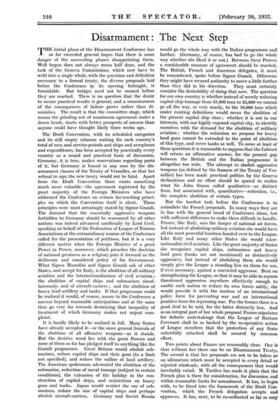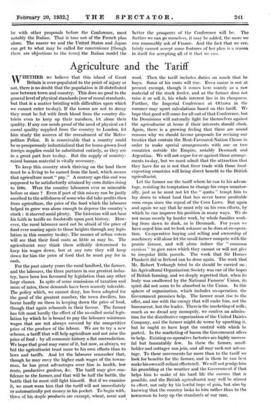Disarmament : The Next Step
THE initial phase of the Disarmament Conference has
so far exceeded general hopes that there is some danger of the succeeding phases disappointing them. Well begun does not always mean half done, and the task of the Geneva Commissions, which now have to weld into a single whole, with the precision and definition necessary to a formal treaty, the diverse proposals laid before the Conference its opening fortnight, is formidable. But bridges need not be crossed before they are reached. There is no question that the desire to secure practical results is general, and a consciousness of the consequences of failure grows rather than di- minishes. The result is that the committee stage,-which means the grinding out of unanimous agreement under a dozen heads, starts with better prospects of success than anyone could have thought likely three weeks ago.
The Draft Convention, with its scheduled categories and its still empty columns waiting for each country's total of men and service-periods and ships and aeroplanes and expenditures, has been accepted by practically every country as a sound and practical basis of discussion. Germany, it is true, makes reservations regarding parts of it, but Germany is bound in any case by the dis- armament clauses of the Treaty of Versailles, so that her refusal to sign the new treaty would not be fatal. Apart from the Draft Convention there exists something much more valuable—the agreement registered by the great majority of the Foreign Ministers who have addressed the Conference on certain far-reaching princi- ples on which the Convention itself is silent. Those principles were most arrestingly stated by Signor Grandi. The demand that the essentially aggressive weapons forbidden to Germany should be renounced by all other nations was indeed advanced unofficially by Lord Cecil, speaking on behalf of the Federation of League of Nations Associations at the extraordinary session of the Conference called for the presentation of petitions, but it is a very different matter when the Foreign Minister of a great Power (a Power, moreover, which preaches the doctrine of national greatness as a religion) puts it forward as the deliberate and considered policy of his Government. What Signor Mussolini and Signor Grandi ask of other States, and accept for Italy, is the abolition of all military aviation and the internationalization of civil aviation ; the abolition of capital ships and submarines simul- taneously, and of aircraft-carriers ; and the abolition of heavy land artillery and tanks. If that programme could be realized it would, of course, assure to the Conference a success beyond reasonable anticipations and at the same time go very far towards destroying that inequality of treatment of which Germany makes not unjust com- plaint.
It is hardly likely to be realized in full. Many States have already accepted it—or the more general formula of the abolition of all offensive weapons—as it stands. But the decisive word lies with the great Powers and none of them so far has pledged itself to anything like the Grandi programme. Great Britain would abolish sub- marines, reduce capital ships and their guns (to a limit not specified), and reduce the calibre of land artillery. The American spokesman advocated the abolition of the submarine, reduction of naval tonnage (subject to certain conditions), the extension of the holiday in the con- struction of capital ships, and restrictions on heavy guns and tanks. Japan would restrict the use of sub- marines, reduce the size of capital ships and perhaps abolish aircraft-carriers. Germany and Soviet Russia would go the whole way with the Italian programme and further. (Germany, of course, has had to go the whole way whether she liked it or not.) Between these Powers a considerable measure of agreement should be reached. The British, French and American delegates, it must be remembered, spoke before Signor Grandi. Otherwise they might have secured authority to move a little further than they did in his direction. They must certainly consider the desirability of doing that now. The question for our own country is whether instead of merely reducing capital ship tonnage from 35,000 tons to 25,009 we cannot go all the way, or very nearly, to the 10,000 tons which under existing definitions would mean the abolition of the present capital ship class ; whether it is not in our interests, with our highly exposed capital city, to identify ourselves with the demand for the abolition of military aviation ; whether the reduction we propose for heavy land guns cannot be extended to the point of abolition of this type, and cover tanks as well. To some at least of these questions it is reasonable to suppose that the Cabinet will return an affirmative answer, for the present gap between the British and the Italian programme is altogether too wide. The attempt to abolish aggressive weapons (as defined by the framers of the Treaty of Ver- sailles) has been made practical politics by the Geneva declarations and no effort should be spared to realize what Sir John Simon called qualitative—as distinct from, but associated with, quantitative—reduction, i.e., the complete abolition of certain types.
But the hardest task before the Conference is to assimilate the French proposals. In many ways they are in line with the general trend of Conference ideas, but with sufficient difference to make them difficult to handle. France, like Italy, sees the danger of national air forces, but instead of abolishing military aviation she would have all the most powerful bombers handed over to the League. Like Italy and many other States she would inter- nationalize civil aviation. Like the great majority of States she recognizes capital ships, submarines and heavy land guns (tanks are not mentioned) as distinctively aggressive, but instead of abolishing them she would simply give the League a standing lien on them for use, if ever necessary, against a convicted aggressor. Bent on strengthening the League, so that it may be able to repress threatened aggression anywhere effectively enough to enable each nation to reduce its own forces safely, she would provide it with the nucleus of an international Police force for preventing war and an international punitive force for repressing war. For the former there is a good deal to be said, for the latter distinctly less. And as an integral part of her whole proposal France stipulates for definite undertakings that the League of Nations Covenant shall be so backed by the co-operative action of League members that the protection of any State unlawfully attacked shall be assured by common effort.
Two points about France are reasonably clear. One is that without her there can be no Disarmament Treaty, The second is that her proposals are not to be taken as an ultimatum which must be accepted in every detail or rejected wholesale, with all the consequences that would inevitably entail. M. Tardieu has made it plain that the French plan is there for consideration, for discussion and within reasonable limits for amendment. It has, to begin with, to be fitted into the framework of the Draft Con. vention, which the French delegation accepts and approves. It has, next, to be co-ordinated as far as may
be with other proposals before the Conference, most notably the Italian. That is true not of the French plan alone. The nearer we and the United States and Japan can get to what may be called for convenience (though there are objections to the term) the Italian model the better the prospects of the Conference will be. The further we can go ourselves, it may be added, the more we can reasonably ask of France. And the fact that we cer- tainly cannot accept some features of her plan is a reason in itself for accepting all of it that we can.







































 Previous page
Previous page